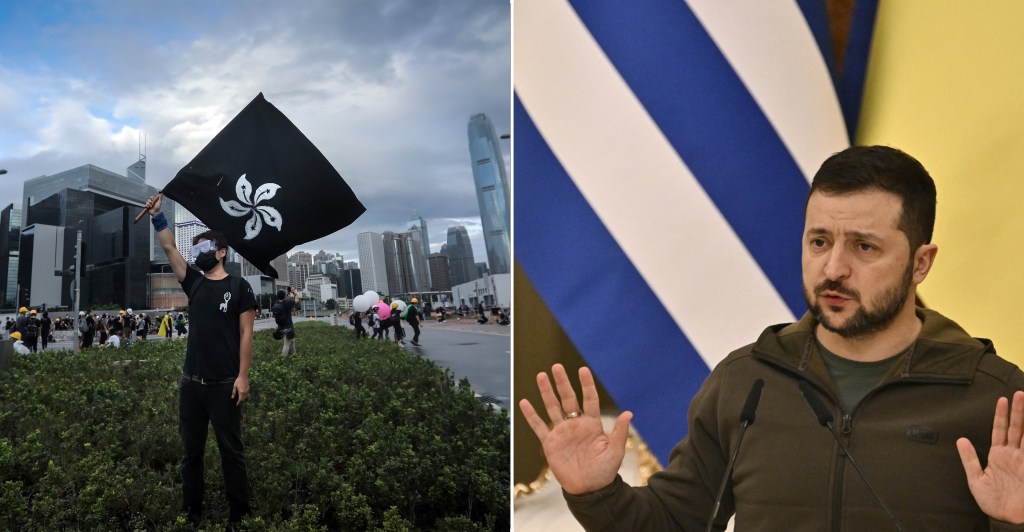Ukraine wanted to thank the foreign fighters who helped defend the country against Russia’s invasion, but accidentally touched on Hong Kong and China’s sore spot instead.
Ukraine’s defense ministry published a video on Sunday to express its gratitude to some 20,000 volunteers from 52 countries who joined its international legion. “You are all heroes and we will win this fight together,” said the video, which was posted on Twitter and deleted within hours.
Videos by VICE
The video featured footage of foreign troops as well as a collage of the flags of the volunteers’ home countries. It includes that of Taiwan and a black-and-white bauhinia flag popularized by pro-democracy protesters in Hong Kong in 2019, sparking a strong reaction from Hong Kong and Chinese authorities.
“There is only one China in the world, and Hong Kong and Taiwan are both part of China,” a spokesperson for the commissioner’s office of China’s foreign ministry in Hong Kong said in a statement on Tuesday. It also called on Ukraine not to show support for “separatist forces seeking Taiwan independence or anti-China forces in Hong Kong.”

As China considers the self-ruled democratic island as part of its territory, it has pressured other countries and international institutions not to recognize Taiwan’s sovereignty, and boycotted companies for displaying Taiwan’s flags or omitting the island from China’s map.
The display of the Hong Kong protesters’ flag was also awkward for China as it is a strategic partner of Russia and has refused to cut ties over its attack on Ukraine. Meanwhile, many of the city’s pro-democracy activists saw a parallel between their struggle for autonomy and Ukraine’s resistance against Russia, and have embraced Ukraine’s cause.
Ukraine’s defense ministry and foreign ministry have not immediately responded to a request for comment.
Speaking to the press on Tuesday, Hong Kong chief executive John Lee also described the use of the black-and-white bauhinia flag as a “diplomatic issue” that will be dealt with through diplomatic methods.
It is the latest in a series of blunders that saw protest symbols used in public occasions instead of the official Hong Kong flag or anthem, a testimony to the lingering power of Hong Kong’s protest art, even as a national security crackdown that followed has stamped out dissent in the city.
In November, during a Rugby Sevens tournament in South Korea, organizers accidentally played an instrumental version of the protest song “Glory to Hong Kong” instead of the Chinese national anthem. Fuming over the incident, the Hong Kong government demanded an investigation and arrested a Hong Kong resident for sedition for his online comments cheering the use of the protest song.
But in less than a month, the same mix-up occurred at a powerlifting competition in Dubai, where the gold medalist made a time out gesture to halt the song, as Hong Kong athletes are now instructed to do. At two other international sports competitions this year, the right song was played, but the wrong title was displayed.
The Hong Kong government has since blamed Google for allowing “Glory to Hong Kong” to show up in search results. Top officials have been pressuring the U.S. company to bury results for the song, deeming it an insult to the Chinese national anthem and thus illegal. Google has so far refused the request, saying it does not “manually manipulate organic web listings to determine the ranking of a specific page.”
“We all know very well that Google has the means to do it; it’s a question of whether Google chooses to do it,” Lee the Hong Kong leader said on Tuesday. “If it chooses not to do it, then I think it has a lot to explain.”






